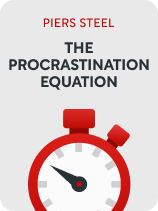

This article is an excerpt from the Shortform book guide to "The Procrastination Equation" by Piers Steel. Shortform has the world's best summaries and analyses of books you should be reading.
Like this article? Sign up for a free trial here.
How does self-esteem affect how much you procrastinate? Why does a fear of failure cause procrastination?
One of Piers Steel’s strategies for avoiding procrastination is building your confidence. The less confidence you have in your ability to succeed, the less motivated you’ll be, and the more likely you are to procrastinate.
Let’s look at the connection between procrastination and self-esteem so you can avoid the bad habit.
Build Your Confidence
Steel notes another aspect of the relationship between procrastination and self-esteem: He says that being too confident about your ability to succeed can also result in procrastination. If you believe that everything will work out no matter what, you might wait for success and good fortune to come to you instead of working to make it happen. Additionally, overconfident people often underestimate the amount of time needed to complete tasks, so they wait until the last minute to begin. This can undermine their results.
(Shortform note: The tendency to overestimate our abilities is so common that psychologists have a name for it—overconfidence bias. This bias affects more than just our perception of the time and effort it takes to complete a task: It can also affect our ability to make ethical decisions. Research suggests that we tend to believe we’re more ethical than our colleagues, peers, and competitors. One study found that 50% of the business people surveyed believed they were more ethical than 90% of people. Because of this bias, we often take ethical issues lightly. We assume we’ll do the right thing instead of reflecting properly on what that might be, making it more likely that we’ll make unethical decisions.)
To successfully avoid procrastination, you must strike a balance between acknowledging the work it’ll realistically take to complete a task and believing that you’re capable of succeeding. (Shortform note: Keeping a work journal can help you strike this balance in the workplace. Documenting your experiences with work tasks—including the time it takes to complete them, issues and insights you have along the way, and so on—creates a clear and realistic picture of what you need to do when you’re faced with the task again. Additionally, reflecting on your achievements and having a record of your progress can build your confidence.)
Technique #1 helps you strike this balance, and Technique #2 helps you increase your confidence when it’s running low:
Technique #1: Break Up Your Tasks Into Smaller Steps
First, Steel advises breaking large tasks into small, manageable steps instead of trying to tackle everything all at once. Each step should be something you know you can achieve. This builds your confidence through small wins—every time you successfully complete one of the steps, your confidence and motivation increase, propelling you toward the next step.
For example, say you’re writing a novel. This is a large, intimidating task—you could easily decide it’s not worth it because it’s too hard and you’ll never finish. Imagine that instead of thinking of it as one big task, you start by committing to writing 300 words every day. After you successfully do this every day for a week, you decide you want to start writing 500 words every day. Over time, your confidence in your ability to finish the novel grows as each small step of reaching your daily word count adds up to a whole book.
(Shortform note: Setting and accomplishing small goals makes us feel good at the molecular level—it’s another way we get a rush of dopamine. As Steel suggests when discussing growing confidence, these positive feelings are addictive. The more goals we complete, the more dopamine our brains get, and the more we want to repeat the behavior that made us feel good. This gives us forward momentum toward our end goal.)
Technique #2: Surround Yourself With Positive Influences
Steel’s second technique for building confidence is surrounding yourself with the right people. We’re strongly influenced by those around us, so it’s important to spend time with people who represent the attitude and beliefs we want to embody. When it comes to confidence, this means choosing friends who offer positivity and encouragement—having others believe in us can help us believe in ourselves. With a strong foundation of self-belief, we have less reason to procrastinate.
(Shortform note: If you’re unsure where to find encouraging, like-minded people, there are a few methods you can try: First, get involved with clubs, organizations, and hobbies that interest you. You’ll have common ground with the other members, making it easier to make friends. Second, build friendships online. There are many websites and forums where you can connect with people all over the world. You don’t have to be in the same physical place to receive meaningful encouragement from friends.)

———End of Preview———
Like what you just read? Read the rest of the world's best book summary and analysis of Piers Steel's "The Procrastination Equation" at Shortform.
Here's what you'll find in our full The Procrastination Equation summary:
- Strategies to help procrastinators increase their motivation and control
- How to make unpleasant tasks feel more valuable for yourself
- Why procrastinators are typically less financially successful






